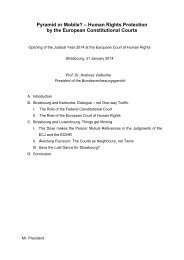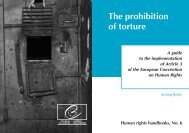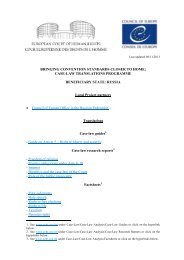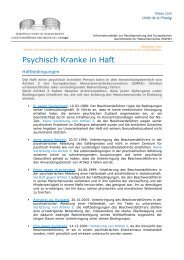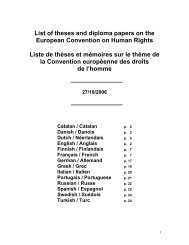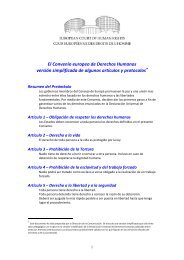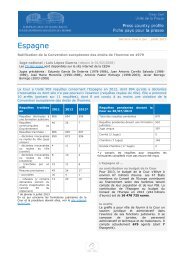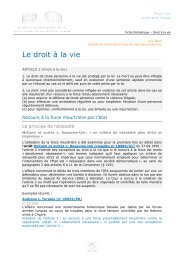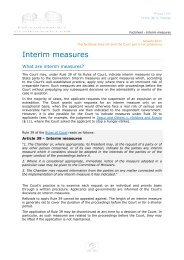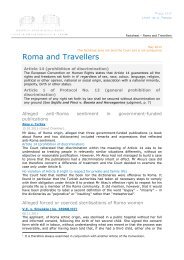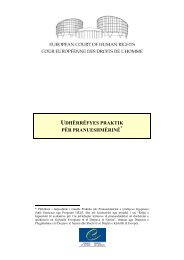Factsheet Mental Health - European Court of Human Rights
Factsheet Mental Health - European Court of Human Rights
Factsheet Mental Health - European Court of Human Rights
You also want an ePaper? Increase the reach of your titles
YUMPU automatically turns print PDFs into web optimized ePapers that Google loves.
<strong>Mental</strong> <strong>Health</strong><br />
<strong>Factsheet</strong> – <strong>Mental</strong> <strong>Health</strong><br />
May 2013<br />
This factsheet does not bind the <strong>Court</strong> and is not exhaustive<br />
“Private Life” (Article 8) covers a person’s physical and moral<br />
integrity<br />
“The preservation <strong>of</strong> mental stability is an indispensable precondition to effective<br />
enjoyment <strong>of</strong> the right to respect for private life” (Bensaid v. the United Kingdom -<br />
06.02.2001)<br />
Interference with private life must be in accordance with the law<br />
A.G. v. Switzerland (09.04.1997: application inadmissible). The <strong>Court</strong> found that “the<br />
decision to place a person in guardianship constitute[d] an interference with private life<br />
that must be in accordance with the law and based on a legitimate aim”.<br />
Storck v. Germany (16.06.2005): violation <strong>of</strong> Article 8 and Article 5 § 1 (right to liberty<br />
and security) concerning the applicant’s internments that had not been ordered by a<br />
court.<br />
The above case also concerned forced medication. As regards this complaint, the <strong>Court</strong><br />
found there had been no violation <strong>of</strong> Article 8 (it had not been proved that the applicant<br />
had not validly given her consent to the medical treatment). In the case <strong>of</strong> Schneiter v.<br />
Switzerland (31.03.2005: application inadmissible), the <strong>Court</strong> found that the complaint<br />
under Article 8 was ill-founded because the forced medication had a legal basis and<br />
pursued a legitimate aim (protection <strong>of</strong> the rights and freedoms <strong>of</strong> others). The<br />
applicant, who was being treated in a psychiatric hospital for various manic-delusional<br />
disorders and multiple drug addition, had struck a nurse on the face.<br />
Shopov v. Bulgaria (02.09.2010): Imposition <strong>of</strong> psychiatric treatment for over five years.<br />
Violation <strong>of</strong> Article 8: The continuing interference with the applicant’s right to respect for<br />
private life had a legal basis, but the regular judicial supervision required by the relevant<br />
legislation had not been forthcoming.<br />
X. v. Finland (03.07.2012): concerned the confinement <strong>of</strong> a paediatrician to a mental<br />
health hospital and her being forcibly administered with drugs, in the context <strong>of</strong> criminal<br />
proceedings against her for aiding and abetting a mother to kidnap her daughter.<br />
Violation <strong>of</strong> Article 5 § 1 (right to liberty and security) and Article 8: the paediatrician’s<br />
involuntary confinement in a mental hospital as well as her being forcibly injected with<br />
drugs had been based on a law which lacked proper safeguards against arbitrariness.<br />
- X. and Y. v. the Netherlands, 26.03.1985: 16-year-old girl, mentally<br />
handicapped, had been sexually abused by the son-in-law <strong>of</strong> the directress <strong>of</strong> the<br />
privately-run home for mentally handicapped children where she was living.<br />
Violation <strong>of</strong> Article 8: Dutch law did not allow for proceedings to be brought in the<br />
event <strong>of</strong> sexual violence against mentally handicapped minors <strong>of</strong> 16 or more.
<strong>Factsheet</strong> – <strong>Mental</strong> <strong>Health</strong><br />
- Bensaid v. the United Kingdom, 06.02.2001: The applicant, who was treated for<br />
schizophrenia, complained that his proposed expulsion to Algeria would leave him<br />
without adequate medical treatment, threatening his physical and moral integrity.<br />
No violation <strong>of</strong> Article 8 – for the <strong>Court</strong>, the risk for the applicant’s mental health<br />
was based on largely hypothetical factors and it had not been established that his<br />
moral integrity would be substantially affected by the situation.<br />
- K. and T. v. Finland, 12.07.2001: Placement in care <strong>of</strong> the children <strong>of</strong> the first<br />
applicant, who had been hospitalised several times for schizophrenia. Violation <strong>of</strong><br />
Article 8 on account <strong>of</strong> the placement <strong>of</strong> one <strong>of</strong> the children, and no violation in<br />
respect <strong>of</strong> the other child, who had previously been placed in a home with the<br />
applicants’ consent; his need for special care justified an emergency care order.<br />
- B. v. Romania (no. 2) (no. 1285/03), 19.02.2013: Psychiatric confinement <strong>of</strong> a<br />
mother and placement in residential care <strong>of</strong> her two minor children. Two<br />
violations <strong>of</strong> Article 8 (confinement <strong>of</strong> the applicant and placement in care <strong>of</strong> her<br />
children). Pointing out that in Romania there had been a number <strong>of</strong> precedents <strong>of</strong><br />
improper confinement <strong>of</strong> individuals with psychiatric disorders, in spite <strong>of</strong> recent<br />
legislative changes in favour <strong>of</strong> patients’ rights, the <strong>Court</strong> held that the absence<br />
<strong>of</strong> special protection (<strong>of</strong>ficial appointment <strong>of</strong> a lawyer or designation <strong>of</strong> a<br />
guardian), had had the effect <strong>of</strong> depriving the applicant <strong>of</strong> her right to take part<br />
in the decision-making process concerning the placement <strong>of</strong> her children in<br />
residential care.<br />
Question <strong>of</strong> legal capacity<br />
Shtukaturov v. Russia, 27.03.2008 (see also below): Applicant placed in guardianship at<br />
his mother’s request. Violation <strong>of</strong> Article 8 - the court had based its decision on a<br />
medical report that had not analysed sufficiently the degree <strong>of</strong> the applicant’s incapacity.<br />
Berková v. Slovakia, 24.03.2009: The applicant, who had a mental disorder, was placed<br />
in guardianship. Violation <strong>of</strong> Article 8, because she had been prevented for too long from<br />
requesting the restoration <strong>of</strong> her legal capacity.<br />
Salontaji-Drobnjak v. Serbia, 13.10.2009: Placement in guardianship <strong>of</strong> the applicant,<br />
who had been diagnosed with litigious paranoia. Violation <strong>of</strong> Article 8 on account <strong>of</strong> the<br />
serious limitation <strong>of</strong> the applicant’s legal capacity (he was unable to independently take<br />
part in legal actions, file for a disability pension, or decide about his own medical<br />
treatment) and because the procedure which the domestic courts had applied when<br />
deciding on it had itself been flawed.<br />
Lashin v. Russia, 22.01.2013: The applicant, a schizophrenic, complained that the<br />
Russian courts had deprived him <strong>of</strong> his legal capacity in June 2000, committed him to a<br />
psychiatric hospital against his will and without possibility <strong>of</strong> review and that this had<br />
prevented him from getting married. Violation <strong>of</strong> Article 8 (maintenance <strong>of</strong> status as an<br />
incapacitated person and inability to have it reviewed in 2002 and 2003)<br />
Violation <strong>of</strong> Article 8 (maintenance <strong>of</strong> status as an incapacitated person and inability to<br />
have it reviewed in 2002 and 2003)<br />
Violation <strong>of</strong> Article 5 § 1 (hospitalisation in psychiatric hospital in 2002-2003)<br />
Violation <strong>of</strong> Article 5 § 4 (inability to obtain review <strong>of</strong> lawfulness <strong>of</strong> detention in the<br />
psychiatric hospital)<br />
See also Mihailovs v. Latvia, 22.01.2013 (see below, page 7)<br />
2
<strong>Factsheet</strong> – <strong>Mental</strong> <strong>Health</strong><br />
M.S. v. Croatia (no. 36337/10), 25.04.2013: The case originated in a dispute between<br />
two sisters (one <strong>of</strong> whom is the applicant) and the owner and employee <strong>of</strong> the restaurant<br />
above which they live, resulting in them bringing criminal proceedings against one<br />
another and the applicant being appointed a guardian in proceedings to divest her <strong>of</strong> her<br />
legal capacity.<br />
Two violations <strong>of</strong> Article 8 as concerned the alleged attack as well as the proceedings to<br />
divest the applicant <strong>of</strong> her legal capacity.<br />
The <strong>Court</strong> found in particular that the criminal proceedings the applicant brought against<br />
the restaurant employee for attacking her were dropped without the facts ever actually<br />
having been established by a competent court <strong>of</strong> law, due to the fact that her guardian<br />
had not given express consent to continue the proceedings. The criminal proceedings<br />
concerning the alleged attack were therefore inadequate and their outcome did not have<br />
sufficient deterrent effect against further violence. The <strong>Court</strong> also found shortcomings in<br />
the proceedings to divest the applicant <strong>of</strong> her legal capacity, which had notably been<br />
requested solely on the basis <strong>of</strong> a report by a psychiatrist who had never had any<br />
contact with her.<br />
Confinement<br />
Article 5 § 1: Right to liberty and security<br />
Everyone has the right to liberty and security <strong>of</strong> person. No one shall be deprived <strong>of</strong> his<br />
liberty save in the following cases and in accordance with a procedure prescribed by law:<br />
(…)<br />
(e) the lawful detention <strong>of</strong> persons for the prevention <strong>of</strong> the spreading <strong>of</strong> infectious<br />
diseases, <strong>of</strong> persons <strong>of</strong> unsound mind*, alcoholics or drug addicts or vagrants.<br />
* “This term is not one that can be given a definitive interpretation: ... it is a term whose<br />
meaning is continually evolving as research in psychiatry progresses, an increasing<br />
flexibility in treatment is developing and society’s attitude to mental illness changes ...” 1<br />
To be in compliance with the Convention, the confinement <strong>of</strong> a person <strong>of</strong> unsound mind<br />
must comply with the requirements laid down in the Winterwerp v. the Netherlands<br />
judgment (24.10.1979), namely:<br />
– it must have been reliably established, through objective medical<br />
expertise, that the patient has a true mental disorder;<br />
– the mental disorder must be <strong>of</strong> a kind or degree warranting compulsory<br />
confinement;<br />
– the validity <strong>of</strong> continued confinement depends upon the persistence <strong>of</strong><br />
such a disorder.<br />
Ashingdane v. the United Kingdom, 28.05.1985: no violation <strong>of</strong> Article 5 § 1 -<br />
even though the applicant, who was suffering from paranoid schizophrenia, had<br />
been exposed to the stricter regime <strong>of</strong> a new psychiatric institution, for nineteen<br />
months longer than his mental state required, the place and conditions <strong>of</strong> the<br />
applicant’s detention did not cease to be those capable <strong>of</strong> accompanying "the<br />
lawful detention <strong>of</strong> a person <strong>of</strong> unsound mind".<br />
Johnson v. the United Kingdom, 24.10.1997: the applicant, who had been<br />
convicted <strong>of</strong> various <strong>of</strong>fences, was placed in a high-security psychiatric institution<br />
on a judge’s orders in 1984 and his release was ordered in 1989, his confinement<br />
no longer being justified. Violation <strong>of</strong> Article 5 § 1 (e) on account <strong>of</strong> the<br />
1 Winterwerp v. the Netherlands, § 37<br />
3
<strong>Factsheet</strong> – <strong>Mental</strong> <strong>Health</strong><br />
prolonging <strong>of</strong> the confinement after that date (lack <strong>of</strong> adequate safeguards,<br />
especially judicial supervision to ensure that the applicant’s release was not<br />
excessively delayed).<br />
Aerts v. Belgium, 30.07.1998: Maintaining <strong>of</strong> the applicant in a psychiatric wing<br />
<strong>of</strong> an ordinary prison and not in a social protection centre designated by the<br />
competent <strong>Mental</strong> <strong>Health</strong> Board. Violation <strong>of</strong> Article 5 § 1 - the psychiatric wing<br />
could not be regarded as an institution appropriate for the detention <strong>of</strong> persons <strong>of</strong><br />
unsound mind.<br />
Nielsen v. Denmark, 28.11.1998: No violation <strong>of</strong> Article 5 § 1 - the hospitalisation<br />
in a Child Psychiatric Ward <strong>of</strong> the applicant, who was suffering from nervous<br />
disorders and whose custody was in dispute between his parents had been “a<br />
responsible exercise by his mother <strong>of</strong> her custodial rights in the interest <strong>of</strong> the<br />
child”.<br />
Varbanov v. Bulgaria, 05.10.2000: the applicant was taken by force to a<br />
psychiatric hospital for tests on a public prosecutor’s orders during court<br />
proceedings. Violation <strong>of</strong> Article 5 § 1 - the applicant’s deprivation <strong>of</strong> liberty had<br />
been decided without any legal basis and domestic law did not afford the requisite<br />
protection against arbitrariness.<br />
Hutchinson Reid v. the United Kingdom, 20.02.2003: no violation <strong>of</strong><br />
Article 5 § 1 - considering the risk that the applicant, who was confined to a<br />
psychiatric institution, might commit other <strong>of</strong>fences, probably <strong>of</strong> a sexual nature,<br />
the decision not to release him, which had a legal basis in domestic law, had been<br />
justified.<br />
Herz v. Germany, 12.06.2003<br />
No violation <strong>of</strong> Article 5 § 1 (e) - temporary confinement had the aim <strong>of</strong><br />
establishing whether the applicant was suffering from a mental illness and had<br />
been ordered by the court based on a medical opinion.<br />
Violation <strong>of</strong> Article 5 § 4 - the fact that a measure <strong>of</strong> temporary confinement had<br />
expired could not deprive the applicant <strong>of</strong> the right to challenge its lawfulness.<br />
Nowicka v. Poland, 03.12.2003: violation <strong>of</strong> Article 5 § 1 on account <strong>of</strong> the<br />
applicant’s detention for 83 days for psychiatric tests ordered during proceedings<br />
that concerned a dispute between neighbours.<br />
M.R.L and M.-J.D. v. France, 19.05.2004: violation <strong>of</strong> Article 5 § 1 (e) -<br />
maintaining the applicant on the premises <strong>of</strong> a psychiatric infirmary had no<br />
medical justification but was for purely administrative reasons (the applicant had<br />
been taken to hospital following a dispute between neighbours and had been<br />
presented to a psychiatrist who, not being able to diagnose his mental state<br />
precisely, decided to have him taken to the psychiatric infirmary <strong>of</strong> the police<br />
headquarters).<br />
H.L. v. the United Kingdom, 05.10.2004: Involuntary confinement <strong>of</strong> an autistic<br />
person who had shown signs <strong>of</strong> agitated behaviour. Violation <strong>of</strong> Article 5 § 1 - as<br />
a result <strong>of</strong> the lack <strong>of</strong> procedural regulation and limits, the hospital's health care<br />
pr<strong>of</strong>essionals, most certainly in good faith, had assumed full control <strong>of</strong> the liberty<br />
and treatment <strong>of</strong> a vulnerable incapacitated individual.<br />
Enhorn v. Sweden, 25.01.2005: Violation <strong>of</strong> Article 5 § 1 - other measures that<br />
would have been less severe than compulsory isolation to prevent the applicant<br />
from spreading HIV had not been envisaged; by extending over a period <strong>of</strong><br />
4
<strong>Factsheet</strong> – <strong>Mental</strong> <strong>Health</strong><br />
almost seven years the order for the applicant’s compulsory isolation, the<br />
authorities had not struck a fair balance between the need to ensure that the HIV<br />
virus did not spread and the applicant’s right to liberty.<br />
Schneiter v. Switzerland, 31.03.2005: application inadmissible (complaint under<br />
Article 5 § 1 ill-founded) - the applicant’s placement in solitary confinement had<br />
been “in accordance with a procedure prescribed by law”; the placement had not<br />
been arbitrary because the applicant, who had already been deprived <strong>of</strong> liberty in<br />
being admitted to a psychiatric hospital for various manic-delusional disorders<br />
and multiple drug addiction, probably constituted a danger for himself and for<br />
others (he was in conflict with his father and had struck a nurse on the face).<br />
Storck v. Germany, 16.06.2005: violation <strong>of</strong> Article 5 § 1 and Article 8 because<br />
the applicant’s placement in a private clinic had not been authorised by a judicial<br />
decision.<br />
Gajcsi v. Hungary, 03.10.2006: violation <strong>of</strong> Article 5 § 1 - the courts had ordered<br />
the prolongation <strong>of</strong> the applicant’s compulsory psychiatric treatment without an<br />
assessment <strong>of</strong> the patient’s dangerousness as required by domestic law.<br />
Filip v. Romania, 14.12.2006: psychiatric confinement ordered by the public<br />
prosecutor after the applicant had been found guilty <strong>of</strong> contempt <strong>of</strong> court (in<br />
criminal proceedings brought against him by his ex-wife and son). Violation <strong>of</strong><br />
Article 5 § 1 because <strong>of</strong> the absence <strong>of</strong> legal basis for this confinement.<br />
Gulub Atanasov v. Bulgaria, 06.11.2008: violation <strong>of</strong> Article 5 § 1 - the transfer <strong>of</strong><br />
the applicant, during pre-trial proceedings, from his home, where he was under<br />
house arrest, to a psychiatric hospital, where he was confined for twenty-six days<br />
to undergo tests, had not been based on a decision validly taken by the<br />
competent authority.<br />
Shopov v. Bulgaria, 02.09.2010: imposition <strong>of</strong> psychiatric treatment for more<br />
than five years. Violation <strong>of</strong> Article 5 § 1 - the public prosecutor and the police<br />
had overstepped the limits <strong>of</strong> a court’s judgment, which had ordered treatment in<br />
an outpatient clinic and not in a psychiatric hospital.<br />
Petukhova v. Russia, 02.05.2013: the applicant complained in particular that she<br />
had been unlawfully held in police custody before being transferred to hospital for<br />
an involuntary psychiatric examination. Violation <strong>of</strong> Article 5 § 1 - given that the<br />
Russian courts had failed to review whether the applicant had indeed refused to<br />
have a psychiatric examination, the <strong>Court</strong> considered that the order authorising<br />
her involuntary psychiatric examination had been unlawful. It further held that,<br />
since the applicant had neither been informed about the order nor given an<br />
opportunity to comply with it, her detention at the police station prior to her<br />
transfer to the hospital for involuntary examination had been inconsistent with<br />
one <strong>of</strong> the exceptions set out under Article 5 § 1 (b), which allowed deprivation <strong>of</strong><br />
liberty in order to ensure compliance with “a lawful order <strong>of</strong> a court”. Her<br />
complaint concerning her involuntary hospitalisation was declared inadmissible.<br />
In these cases the <strong>Court</strong> also found violations <strong>of</strong> Articles:<br />
- 3 (prohibition <strong>of</strong> degrading treatment). See Grand Chamber Judgment Stanev v.<br />
Bulgaria below.<br />
5
<strong>Factsheet</strong> – <strong>Mental</strong> <strong>Health</strong><br />
-5 § 3 (right for a person deprived <strong>of</strong> liberty to be brought promptly before a judge, to<br />
be tried within a reasonable time or released pending trial):<br />
Winterwerp v. the Netherlands, 24.10.1979<br />
-5 § 4 (right for a person deprived <strong>of</strong> liberty to have the lawfulness <strong>of</strong> his detention<br />
decided by a court):<br />
Megyeri v. Germany, 12.05.1992: Failure to assign counsel as requested by applicant –<br />
confined in a psychiatric hospital – in the context <strong>of</strong> the annual review <strong>of</strong> his case by the<br />
courts.<br />
Varbanov v. Bulgaria, 05.10.2000<br />
Hutchinson Reid v. the United Kingdom, 20.02.2003<br />
H.L. v. the United Kingdom, 05.10.2004<br />
Shtukaturov v. Russia, 27.03.2008<br />
Gulub Atanasov v. Bulgaria, 06.11.2008<br />
-5 § 5 (right to compensation for a person deprived <strong>of</strong> liberty in conditions contrary to<br />
Article 5):<br />
Gulub Atanasov v. Bulgaria, 06.11.2008<br />
-6 § 1 (right to a fair hearing within a reasonable time):<br />
H.F. v. Slovakia, 08.11.2005 (proceedings for deprivation <strong>of</strong> legal capacity)<br />
Shtukaturov v. Russia, 27.03.2008<br />
Salontaji-Drobnjak v. Serbia, 13.10.2009<br />
Nenov v. Bulgaria, 16.07.2009: Violation <strong>of</strong> Article 6 § 1 as the applicant, who was<br />
suffering from a mental illness, which is why his ex-wife had applied to have his right <strong>of</strong><br />
contact with their children modified, had not been assigned counsel to defend his case<br />
effectively.<br />
Shtukaturov v. Russia, 27.09.2008:<br />
Violation <strong>of</strong> Article 5 § 1: the decision to hospitalise the applicant had been based<br />
purely on the applicant’s legal status, as defined ten months earlier; the <strong>Court</strong><br />
therefore considered that it had not been “reliably shown” that the applicant’s<br />
mental condition had necessitated his confinement.<br />
Violation <strong>of</strong> Article 5 § 4: the applicant could not pursue any legal remedy to<br />
challenge his continued detention as he had been deprived <strong>of</strong> his legal capacity.<br />
Violation <strong>of</strong> Article 6 § 1: the proceedings to deprive the applicant <strong>of</strong> his legal<br />
capacity at his mother’s request had been vitiated by procedural irregularities (in<br />
particular a ten-minute hearing).<br />
Violation <strong>of</strong> Article 8 (see above).<br />
Violation <strong>of</strong> Article 34 (right <strong>of</strong> individual application): Russia had not complied<br />
with the interim measure indicated by the <strong>Court</strong> (to the effect that the applicant<br />
and his lawyer should be provided with the necessary time and facilities to meet<br />
and prepare the case before the <strong>Court</strong>).<br />
In the case <strong>of</strong> C.B. v. Romania, 20.04.2010, the <strong>Court</strong> found that there had been:<br />
A violation <strong>of</strong> Article 5 § 1 (e): the applicant’s confinement in the context <strong>of</strong><br />
proceedings brought against him by a policemen for bringing malicious<br />
accusations had been unlawful (confinement based on the investigators’ doubts<br />
as to the applicant’s mental health and on a medical certificate by a general<br />
practitioner who had never seen him; no alternative measure examined; use <strong>of</strong><br />
force during arrest).<br />
A violation <strong>of</strong> Article 5 § 4: the confinement measure had not been the subject <strong>of</strong><br />
any review by the courts.<br />
6
<strong>Factsheet</strong> – <strong>Mental</strong> <strong>Health</strong><br />
Stanev v. Bulgaria, Grand Chamber judgment <strong>of</strong> 17.01.2012: concerned a man<br />
forced to live for years in an unsanitary and dilapidated psychiatric institution<br />
with inadequate food and heating and no activities for residents.<br />
Violation <strong>of</strong> Article 5 § 1: the applicant was illegally detained in the institution in<br />
question;<br />
Violation <strong>of</strong> Article 5 § 4: impossibility for the applicant to bring proceedings to<br />
have the lawfulness <strong>of</strong> his detention decided by a court;<br />
Violation <strong>of</strong> Article 5 § 5: impossibility for the applicant to apply for compensation<br />
for his illegal detention and the lack <strong>of</strong> review by a court <strong>of</strong> the lawfulness <strong>of</strong> his<br />
detention;<br />
Violation <strong>of</strong> Article 3 (prohibition <strong>of</strong> degrading treatment): conditions in which the<br />
applicant was forced to live;<br />
Violation <strong>of</strong> Article 13 (right to an effective remedy): impossibility for the<br />
applicant to apply for compensation regarding his degrading living conditions;<br />
Violation <strong>of</strong> Article 6 § 1 (right to a fair hearing): applicant was denied access to a<br />
court to seek restoration <strong>of</strong> his legal capacity.<br />
X. v. Finland, 03.07.2012 : the case concerned the confinement <strong>of</strong> a paediatrician<br />
to a mental health hospital and her being forcibly administered with drugs , in the<br />
context <strong>of</strong> criminal proceedings against her for aiding and abetting a mother to<br />
kidnap her daughter, suspected <strong>of</strong> being sexually abused by her father.<br />
Violation <strong>of</strong> Article 5 § 1 (right to liberty and security) and Article 8 (right to<br />
protection <strong>of</strong> private life) <strong>of</strong> the <strong>European</strong> Convention on <strong>Human</strong> <strong>Rights</strong>.<br />
Plesó v. Hungary, 02.10.2012: the <strong>Court</strong> found that the forced committal to a<br />
psychiatric hospital <strong>of</strong> a young man against his will to prevent a deterioration <strong>of</strong><br />
his health was not justified. Violation <strong>of</strong> Article 5 § 1 (right to liberty and<br />
security).<br />
Mihailovs v. Latvia, 22.01.2013: the applicant had been had been held against his<br />
will in a social care institution for more than ten years without possibility <strong>of</strong><br />
release. The <strong>Court</strong> found a violation <strong>of</strong> Article 5 § 1 (right to liberty and security)<br />
on account <strong>of</strong> the applicant being held in a social care institution between January<br />
2002 and April 2010, and no violation <strong>of</strong> Article 5 § 1 on account <strong>of</strong> him being<br />
held in another institution from 1 April 2010 onwards; and,<br />
Violation <strong>of</strong> Article 5 § 4 (right to liberty and security – right to have the<br />
lawfulness <strong>of</strong> one’s detention decided speedily by a court) on account <strong>of</strong> the<br />
applicant’s inability to obtain a review <strong>of</strong> the lawfulness <strong>of</strong> his placement in the<br />
social care institution between January 2002 and April 2010 and no violation <strong>of</strong><br />
Article 5 § 4 from 1 April 2010 onwards.<br />
<strong>Mental</strong> health in the army<br />
In these cases, the <strong>Court</strong> found violations <strong>of</strong> Article 2 (right to life) on the<br />
grounds, in particular, that the regulatory framework had been defective as<br />
regards the monitoring <strong>of</strong> conscripts.<br />
Kılınç and Others v. Turkey, 07.06.2005: a conscript, suffering from atypical depression,<br />
committed suicide while he was doing his compulsory military service.<br />
Violation <strong>of</strong> Article 2 - the regulatory context had been defective as regards the<br />
procedure to be followed by service doctors for establishing and monitoring Mr Kılınç’s<br />
mental fitness for service before and after his call-up.<br />
7
<strong>Factsheet</strong> – <strong>Mental</strong> <strong>Health</strong><br />
Abdullah Yılmaz v. Turkey, 17.06.2008: a conscript committed suicide while he was<br />
doing his compulsory military service, after being reprimanded and beaten by a<br />
sergeant.<br />
Violation <strong>of</strong> Article 2 (inability <strong>of</strong> the sergeant to assume the responsibilities <strong>of</strong> an army<br />
pr<strong>of</strong>essional whose job was to protect the physical and mental integrity <strong>of</strong> conscripts<br />
placed under his orders; in the <strong>Court</strong>’s view, the regulatory framework had proved<br />
deficient regarding the sergeant’s pr<strong>of</strong>essional ability to <strong>of</strong>ficer the unit, and regarding<br />
his duties and responsibilities when faced with delicate situations such as the one that<br />
had arisen in this case).<br />
Servet Gündüz and Others v. Turkey, 11.01.2011: a conscript committed suicide in 2002<br />
when he was doing his compulsory military service in Hakkari, a province on the southeastern<br />
border <strong>of</strong> Turkey. The young man killed himself by walking onto a minefield after<br />
an argument with his superior.<br />
Violation <strong>of</strong> Article 2<br />
Media Contact : Céline Menu-Lange<br />
+33 3 90 21 42 08<br />
8



